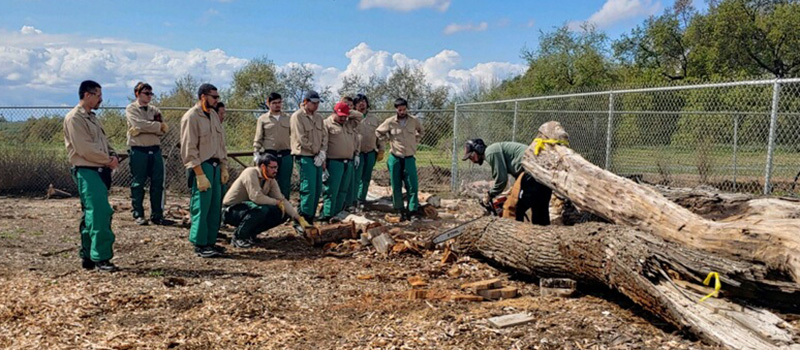
(Photo: Adam Hernandez)
One of the critical solutions to California’s wildfire crisis is creating healthier, sustainable forests. Yet, this vital undertaking faces a major barrier: the lack of a trained workforce.
An innovative partnership in Central California seeks to fill that void. Known as the Central Valley Forestry Corps, the initiative launched its first class of recruits this spring – a hardy and dedicated collection of individuals who signed up to train and serve as modern-day forestry workers.
Upon completion of the program, these new additions to California’s workforce will make their mark within federal, state, and private forestlands, where they will fight fires as well as conduct fuels reduction and reforestation activities. The benefits will reach across California in the form of reduced wildfire threats, enhanced safety, and increased forest resilience, cleaner air and protected water supplies.
The program is funded by a $1.675 million grant from the California Department of Forestry and Fire Protection (CAL Fire) to recruit, train and deploy 100 young adults, with a particular focus on students coming from mountain communities and urban/rural centers in the Central Valley with high rates of unemployment. Students attend at no charge.
“It has been such a crisis in California to have so many devastating wildfires,” said David Clark, dean of instruction at Reedley College, part of the California Community Colleges system. “This is a timely project. The students will become wildland firefighters and also will be trained in fuel reduction work.”
Joining Reedley College in a three-way partnership to implement the program are the Fresno Regional Workforce Development Board and the Fresno Economic Opportunities Commission Local Conservation Corps. The project was born of a host of concerns related to the state’s wildfire crisis, including smoke-filled air that settles each fire season on the Valley floor from wildfires in the Sierra.
“Every summer in fire season, we have dreaded what we knew would happen,” said Blake Konczal, executive director of the Fresno Regional Workforce Development Board. He described the southern Sierra as the epicenter of a dead tree epidemic that has increasingly fed mega-fires that harm rural and urban areas.
It made sense, Konczal said, to build on and leverage an already strong forestry program at Reedley College, the strengths of the local workforce development community, and the needs of CAL Fire in developing an adequate forestry workforce. The Reedley College Forestry and Natural Resources program, which leads to an associate of science degree, is accredited by the Society of American Foresters. The new CAL Fire grant was designed to increase the pace of tree removal for forest health and expand the advanced forestry training program at Reedley to address changing needs in forests.
The initiative represents a promising model in harmony with approaches being explored through the California Economic Summit to achieve a more wildfire-safe state through accelerated forest resilience work. The challenges, including workforce needs, are highlighted in the Summit’s report, “California’s Wildfire Crisis: A Call to Action.”
Jim McDougald, CAL Fire division chief of protection and planning with the Fresno Kings Unit, noted that the Forestry Corps program provides students with skills and training beyond tool and machinery operation. They must learn about protecting sensitive wildlife species, habitats and streams, as well as proper prescriptions for replanting and spacing trees.
“These are good permanent year-round jobs where people can become foresters and also move into the management pipeline,” McDougald said.
Among the students in the program is Eddie Murphy III, 34, a Fresno resident who previously had been supporting his young family in a job involving hazardous materials removal. In January, on his way to work, he heard a radio announcement about the new Forestry Corps. It reminded him of arborist work he had previously done and enjoyed. Murphy is now well into the program and excited about his future.
“When I heard the word forestry, it turned a light on in my head. I knew I wanted to go back to working with trees. And there are so many options with this program,” Murphy said.
Because of the COVID-19 crisis, classes that began earlier this spring for the program’s first cohort of students shifted to an online format. Murphy said he has appreciated and enjoyed the training, where he has learned not only about safe equipment operation, but also the scientific underpinnings to managing forests sustainably. During the last eight weeks of the program, he and other recruits will take part in paid-work experience clearing fuels from forested areas, which is considered “essential” work under government guidelines during the pandemic.
Murphy said he hopes to secure a position as a forestry technician, continue his education, and move into the work of managing and conserving public lands. “I am learning everything I can in forestry, to the best of my ability,” he said. “This is just the beginning for me.”

